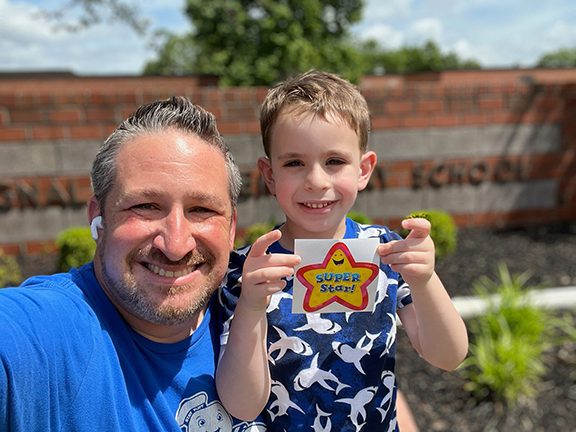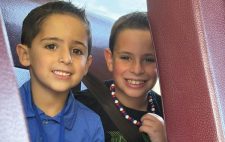“Daddy, there’s a criminal outside and the police are going to get him.”
That’s what Brandon said as a helicopter hovered overhead with a manhunt going on outside. It had just started though. How did he know that already? We didn’t show him the social media posts and notifications to shelter in place. We didn’t let him hear the phone call from the police. Yet he still had an idea what was going on. We tried to decide what to tell him about: the criminal or the helicopter? We didn’t want him to be scared, but the blinds were closed and the helicopter was over our house for over 3 hours. We couldn’t just move on without saying anything like we did with Adam. It’s the latest example of how we have slowly realized we can’t just ignore things with Brandon anymore. He has questions, and we know he understands far more than we realize.
The police activity in our neighborhood happened days after the latest school shooting, which again got my brain worrying about how to explain these things to him.

Until now, we didn’t really have to explain school shootings, active shooter drills or anything like that to Brandon. We avoided turning on the news, we didn’t talk about it aloud in front of him, and he was too young to really understand. We have been able to shield him, whatever that means, from some of the horrors we seem to see regularly now. But no matter how much we try to protect him, there is no way for us to watch him 24 hours a day to make sure he is truly safe. And would that really make him safe?
I know telling him nothing would be naive. He’d find out from his friends or overhear something from other adults. And those people would say their own version of the story, which might not be right either. Then we’d have to explain, rather than talking to him ourselves. But what could we say to not scare him, or even ourselves, too much in the process?
A few days later, Brandon and I went to his kindergarten evaluation, and we saw a police officer sitting outside in a police car. Brandon told me the officer was there to “keep the school safe from bad people.” It hit me that those active shooter drills I wasn’t sure how to explain would be something Brandon would be doing next year. He would be preparing for what to do in case a bad person came to school, which gives me chills to even write and think about.
The officer keeping the school safe from bad people sounded like it answered any questions Brandon had then, so I didn’t go further. I just left things there, but I still wasn’t sure. So I asked other parents and teachers what they thought about how we should approach things and what we should say or do.
The first thing I learned is I wasn’t even using the right words. Teachers let me know that it is a lockdown, lockout or shelter-in-place, so if we are going to talk to him about it, we better figure out what we are saying. The next thing I learned is everyone handles it differently, and most have their own advice for what to say, or not say. Some people said we should let the teachers explain it. Some said to tell him the complete truth. Others said we should tell him just enough so he wouldn’t be scared. Some offered specific advice on how to approach and talk about thoughts or fears.
Despite all the advice I got, I kept thinking of something one parent shared with me –about how fairy tales are used as a vehicle to help children understand challenging things. They said, “Fairy tales are more than true: not because they tell us that dragons exist, but because they tell us that dragons can be beaten.” I just want Brandon to understand we can beat the dragons, so he isn’t afraid. I don’t want to have to explain to him why they exist. Actually, I don’t even want to have this conversation at all. But that doesn’t seem like an option anymore. Parenting is hard.














